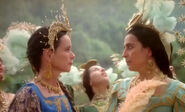
Former wife of the Laputan king, filling the role of Munodi in the 1996 TV adaptation.
Balnibarbi is located below the floating island of Laputa. The islands are at war with one another.
Story[]
Discontent with being stuck on flying island of Laputa, Gulliver is lowered down to Balnibarbi where he meets Munodi, who is the former governor of the city of Lagado. Munodi leads Gulliver on a tour around the island, which turns out to be a unique place indeed. Apart from Munodi's own estate, which seems to flourish and thrive, the rest of the land has been ruined and eroded away. It seems that several people decided to visit Laputa, and were dissatisfied with their own existence down below. Upon their return, they established the "Academy of Projectors" with goal of changing the direction of all the "arts, sciences, languages and mechanics" of the land, and sought "to contrive new rules and methods of agriculture and building." None of their plans worked, however, and instead destroyed the land - which became unproductive. Only Munodi's fields remained bountiful, because he ignored these new directives and followed the customs of his ancestors.
Gulliver visits this "Grand Academy" in order to observe the follies of the numerous experiments being conducted there. The original intent of these projects seem to have been legitimate, if misguided attempts to improve some aspect of life for the betterment of their society. However, Gulliver realizes their common futility right away as he observes people trying to extract sunshine from cucumbers, revert human excrement to its original nutrition sources, and make gunpowder from ice, among other ludicrous things. Another project is to abolish words altogether by carrying around all the items necessary to communicate through visual props. Gulliver feels that none of the projects have any merit whatsoever in the effort to improve anything, and that these scientists of sorts are all on a great fool's errand of sorts.
Trivia[]
- Despite being smaller than Honshu (with a circumference of ~30 km), the main island of Japan, the book classifies Balnibarbi as a continent.
- In Japanese-language translations, Balnibarbi's name is spelled as バルニバービ (Barunibaabi).

